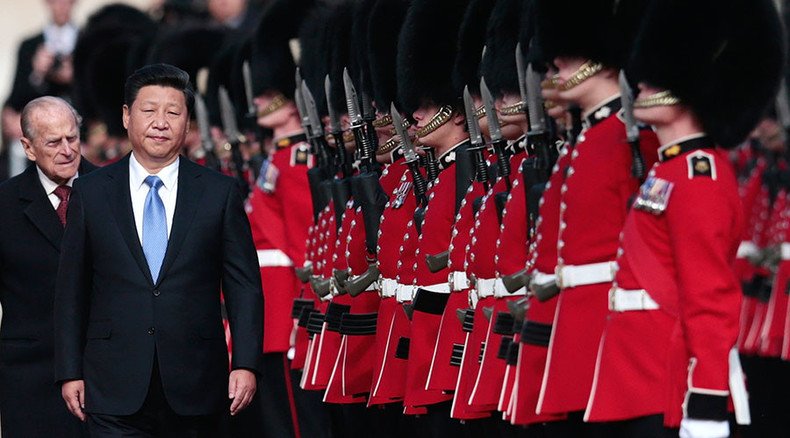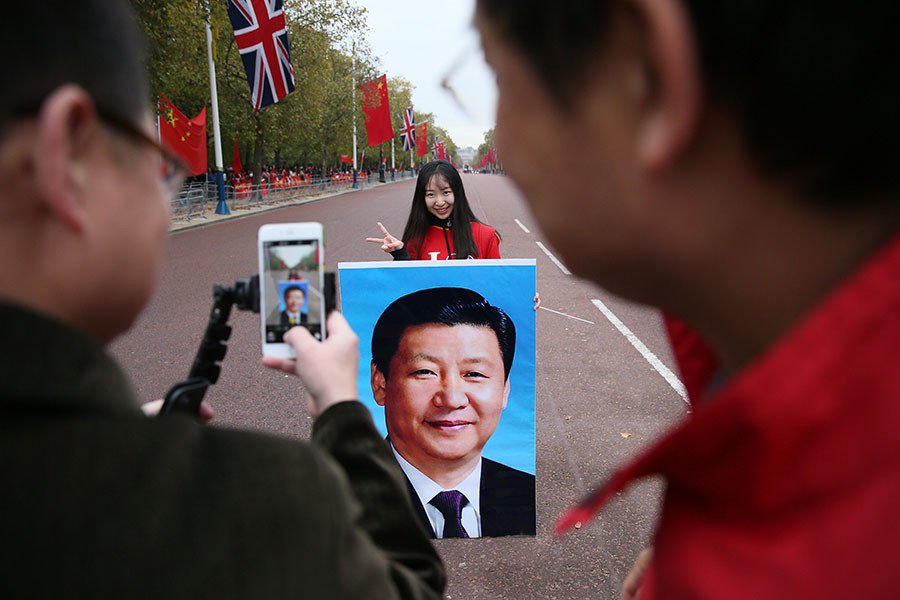‘British don’t have a dog in the China-US fight’

The UK is not bumping up against the Chinese the way the US is in places like the South China Sea, Conn Hallinan of Foreign Policy in Focus told RT. Britain wants to pump up its economy by cooperating with China, he added.
Chinese leader Xi Jinping arrived Monday in the UK on a four-day state visit. Together with British Prime Minister David Cameron they hailed it as the beginning of a 'golden era' in relations between the two countries.
RT: What do you make of this visit? Will the two countries benefit?
Conn Hallinan: I think what you’ve got – this particular visit to Britain is very important for the current Conservative government, because economically the EU is in trouble, and the British economy has never really recovered back to its 2008 status before the big worldwide financial meltdown. So any kind of investment on the part of China is going to be a godsend. Over the past four years there has been a pretty significant increase in Chinese investment, going from about $500 million to about $8.5 billion, which is still pretty small potatoes for the Chinese, but it is not small potatoes for the British.
What’s interesting is you really do have a kind of a difference here between the British and the Americans on China. Much of that is related to the fact that the British do not want to get into a fight with what they see as a potential major investor in their economy.
WATCH LIVE: Queen Elizabeth II welcomes Chinese leader to London https://t.co/qJlQjER0Glpic.twitter.com/4yruT6Gbdh
— RT (@RT_com) 20 октября 2015RT: UK is one of the closest allies of the US. We know that the US has a lot of disputes with China, for example in the South China Sea. Do you think they are going to touch upon this particular issue? Or are there any kind of differences in US and UK approaches here?
CH: In Britain that is going to be muted. First of all, the British are not really bumping up against the Chinese the way the Americans are in places like the South China Sea. Britain doesn’t really have allies with exception of maybe Australia and New Zealand the way the US has with the Philippines, Japan, and South Korea, etc. British Empire – the sun set on that Empire a long time ago. So in a sense they don’t have that much of a dog in the fight between China and the US.
READ MORE: Xi Jinping state visit won’t harm UK-US relations – Cameron
Also, you have a kind of impatience with American foreign policy, increasingly in Europe; increasingly the EU is not particularly happy about the outcome of the sanctions directed at Russia. It has done more damage to the EU than it has done to Russia. The Americans asked the British not to take part in the Asian Infrastructure Investment Bank [AIIB]. British paid no attention at that and joined right in.
So you really do have a kind of a difference here. I think a major part of it is that the Conservative government has to deliver on the economy, and they are not doing that. The policies of austerity and assorted cutbacks that are a sort of the standard pattern now in Europe are not making economies better, they are making economies worse.
What is happening is that people like Cameron and the Conservative government in Britain, and a lot of the Conservatives in the EU are looking over their shoulders at the last few elections. The left won big in Greece, the left won big in Portugal; there is a very important election is coming up in December in Spain – fifth-largest economy in the EU. If it goes to the left this is going to mean a sea change in what the EU is doing.
So Cameron wants that trade, because he wants to pump up the British economy, so he doesn’t get a lot of criticism from the left. And I think that’s true all the way across the European continent.

RT: Do you think there is major division on some issues between the US and the UK at this point?
CH: Not only were there clear differences on the AIIB, but now the US has had to basically admit that it was a mistake to ask people not to take part in the bank. Mainly because they couldn’t keep anybody from doing it. I think Japan and the Philippines were the only countries that didn’t join in the Infrastructure Bank, including South Korea, which is of course a major ally of the US. Again what you see here is that the US is kind of throwing the weight around in a way in which they don’t have the same weight anymore. I think that the British are going to look after themselves. So, does this mean there is a major division between the British and the Americans? Not on the Middle East, but on Asia – yes, I do think so.
We also have division now between what Europe wants, what a lot of European countries want, and what big international financial organizations like the World Bank and the International Monetary Fund [IMF] want. The AIIB will make it much easier to get development loans than you’d get from the IMF or the World Bank. The British are looking at that, and I think they are getting pressure from some of their friends and their major trading partners in Asia and throughout the world that they want the British on board in terms of an alternative to the IMF and the World Bank. And the British are picking that up.
LISTEN MORE:
The statements, views and opinions expressed in this column are solely those of the author and do not necessarily represent those of RT.












